
The Gomphillaceae are a family of lichen-forming fungi in the order Graphidales. Species in this family are found mostly in tropical regions.

Phaeographis is a genus of lichen-forming fungi in the family Graphidaceae. It has an estimated 180 species.

Graphis is a genus of lichen-forming fungi in the family Graphidaceae. Historically, Graphis was used as a broad category for species with colourless, transversely septate ascospores within the Graphidaceae. However, with advances in genetic research, this classification has become more refined. As a result, species previously classified under Graphina have been re-assigned to Allographa or Graphis. The species complex around Graphis scripta has also been recognised, leading to the identification of several new species, many of which may have been previously overlooked.
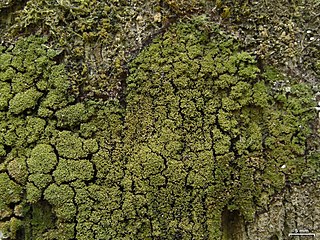
Phyllopsora is a genus of lichen-forming fungi in the family Ramalinaceae. It was circumscribed by Swiss botanist Johannes Müller Argoviensis in 1894, with Phyllopsora breviuscula assigned as the type species.

Pannaria is a genus of lichen-forming fungi in the family Pannariaceae. The widespread genus contains an estimated 51 species, found primarily in tropical regions.

Anthracothecium is a genus of lichen-forming fungi in the family Pyrenulaceae.

Myriotrema is a genus of lichen-forming fungi in the family Graphidaceae.

Thelotrema is a genus of lichen-forming fungi in the family Graphidaceae, the family to which all taxa in the former Thelotremataceae now belong.
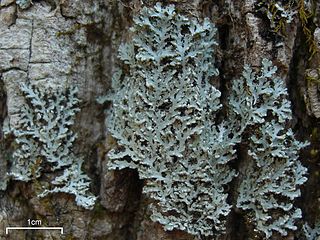
Heterodermia is a genus of lichenized fungi in the family Physciaceae. The genus has a widespread distribution, especially in tropical regions, and contains about 80 species.

Dirinaria is a genus of lichenized fungi in the family Caliciaceae. The genus has a widespread distribution, especially in tropical regions, and contains about 35 species.

Pyxine is a genus of foliose lichens in the family Caliciaceae. The genus has a widespread distribution in tropical regions.

Phaeophyscia is a genus of lichen-forming fungi in the family Physciaceae.

Leptogium is a genus of lichen-forming fungi in the family Collemataceae. It has about 110 species. Species formerly classified under Leptogium have since been divided among the genera Leptogium, Pseudoleptogium, and Scytinium. Leptogium lichens are predominantly found on tree bark or soil, often among mosses, and sometimes on rocks in moist environments.
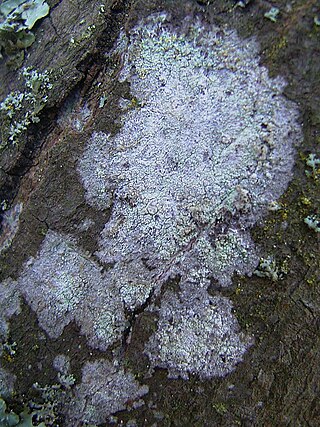
Phlyctis is a genus of lichenized fungi in the order Gyalectales, and the type genus of the family Phlyctidaceae. Members of the genus are commonly called blemished lichens.
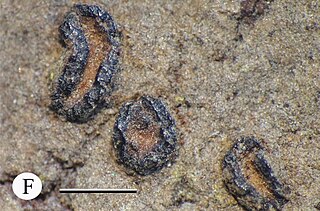
Allographa is a genus of script lichens in the family Graphidaceae. It has nearly 200 species. Formally circumscribed in 1824 by François Fulgis Chevallier, Allographa was formerly included in Graphis, but was upgraded to generic status in 2018 by lichenologists Klaus Kalb and Robert Lücking, who used molecular phylogenetics analysis to show this group of species to constitute a distinct lineage in the Graphidaceae.
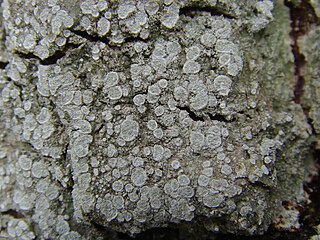
Lepra is a genus of lichen-forming fungi in the family Pertusariaceae. Although the genus was created in 1777, it was not regularly used until it was resurrected in 2016 following molecular phylogenetic analyses. It has more than a hundred species, most of which were previously classified in genus Pertusaria.

Graphina is a genus of script lichens in the family Graphidaceae. It has about 25 species. The genus was circumscribed in 1880 by Swiss lichenologist Johannes Müller Argoviensis. Müller Argoviensis did not indicate a type species for the genus in his original publication; David Hawksworth proposed to designate Graphina anguina as a lectotype in 1981.
















